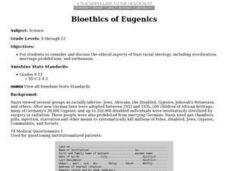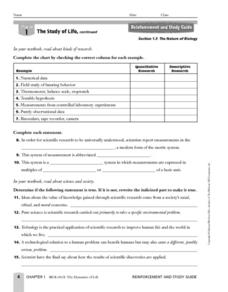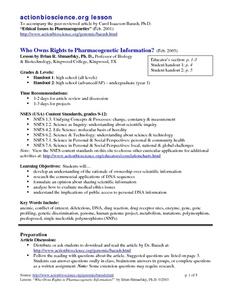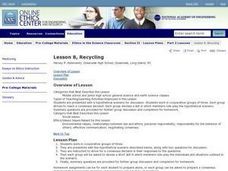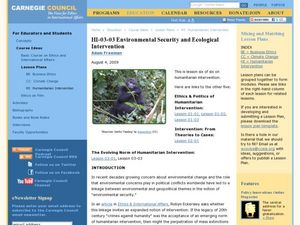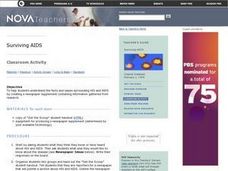Curated OER
Breaking News English: Parkinson Disease
In this Parkinson disease worksheet, students read the article, answer true and false questions, complete synonym matching, complete phrase matching, complete a gap fill, answer short answer questions, answer discussion questions, write,...
Curated OER
Dispose of Waste Properly
Students examine how to dispose of waste properly and discover how pollution affects plants and animals that live in streams. In this effects of waste lesson, students explore biodegradable detergents and the concept of dilution as the...
Curated OER
Ethics Search Project
Students question, imagine, and investigate certain scientific environmental issues. They organize their data and present a PowerPoint presentation. They include include a complete analysis of St Ignatius commitments and ideas.
Curated OER
Ethical Problems Surrounding Surrogate Motherhood
Students examine the definition of surrogacy and the types of surrogacy. They analyze surrogacy and the law. They conduct debates, skits and teen forums regarding the subject of surrogacy.
Curated OER
Bioethics of Eugenics
Young scholars research and discuss the ethical aspects of Nazi racial ideology, including sterilization, marriage prohibitions, and euthanasia. They develop codes of ethics regarding reproductive rights, euthanasia, and the death penalty.
Curated OER
Genetic Testing for Disease Susceptibility
Learners explore how testing for particular genetic variations can help people to make decisions in lifestyle and health care choices. They analyze a Web-based case study, participate in class discussion, view video segments and...
Curated OER
The Study of Life
In this scientific research worksheet, students will complete a chart by determining if the statements given are examples of quantitative research or descriptive research. Then students will fill in the blank of 8 statements about the...
Curated OER
Pilgrims and Puritans
With graphic organizers galore, learners will follow the changes of church and state in early colonial America. They look at the differences between the pilgrims and the puritans in terms of beliefs and life ways. Myths and...
Curated OER
Whose Life Is It?
Students consider the implications of cloning. In this science and ethics instructional activity, students consider when cases of cloning are ethical and when they are not as they discuss scenarios and their discussion questions.
Curated OER
Can You Detect Bias?
Eleventh graders recognize some, but not all ethical processes (e.g., independent verification, clarifying assumptions, disclosing conflicts of interest) that shape scientific endeavors. Students build awareness of how various sources...
Curated OER
Who Owns Rights to Pharmacogenetic Information?
Students develop an understanding of the rationale of ownership over scientific information. They research commercial applications of DNA sequences. They analyze how to evaluate medical ethics issues.
Curated OER
Lesson 8, Recycling
Students examine recycling. In this environmental stewardship lesson, students practice persuading others to recycle as they collaborate to prepare small group skits. Students discuss the issue and write reflections about the experience.
Curated OER
Energy Conservation
Students complete a variety of activities as they examine forms of energy, use of energy, different technologies to harness energy and the ethical implications of these sources and technologies.
Curated OER
Throwing Precaution to the Wind Validity of the Precautionary Principle for Solving Climate Change
Young scholars study climate change and come up with possible remedies for it. In this global warming instructional activity students complete and activity and watch a video on climate change.
Curated OER
You Do It and You Clean It Up
Students explore pollution. In this pollution lesson students participate in activities to help them better understand industrial pollution.
Curated OER
Environmental Security and Ecological Intervention
Students examine environmental changes . For this investigative lesson students view a film then complete and activity that includes a debate.
Curated OER
Models of Succession
Students create a model city in order to understand the effects human habitats have on the environment. In this environment lesson, students examine the effects human habitats have on the environment. Students create a model city and...
Curated OER
Does Climate Change Exist? Healthy Skepticism? Debating the Truth, Evidence, and Certainty of Climate Change
Students study climate change and the arguments of scientists that it exists. For this climate change lesson students complete a class activity and answer questions.
Curated OER
From the Right to Intervene to the Responsibility to Protect
Students examine humanitarian work and how it has evolved. In this humanitarian lesson students complete an in class activity then discuss their findings.
Curated OER
Implementation Schedule
Students observe a schedule for sharing computers in the classroom. When using the computers, students perform specific instructions in various curriculum areas. For example, in math, students visit a given website to find the area,...
Curated OER
The Common Tragedy of Consumerism
Pupils evaluate the effectiveness of current climate change solutions. In this global warming lesson, students look at the current measures implemented and analyze whether they are beneficial to the environment or not. Advance reading...
Curated OER
The Great Cafeteria Caper
Students extract DNA from their own hair roots. They run an electrophoresis gel to examine patterns of their DNA along with standard DNA. The experiment is based on a crime scene scenario.
Curated OER
Surviving AIDS
Enhance your middle and high schoolers' research skills with this instructional activity. After viewing a video clip about HIV and AIDS, high schoolers identify the facts and issues surrounding the disease. They work together to create a...
PBS
Technology: Conveniences and Consequences
It's a delicate balance—using technology to improve our lives while still protecting the environment, and ourselves, from the hazards of technology use. Class members examine statistics about the increase in media use, complete a survey...






